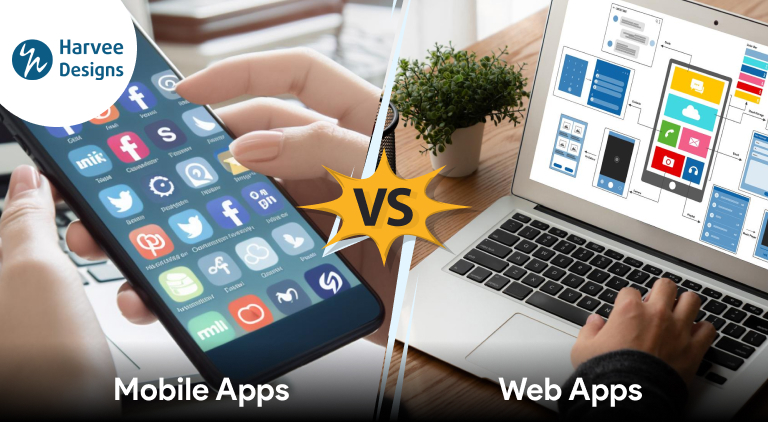
Mobile Apps vs Web Apps: Making the Right Choice
The idea that online applications and mobile apps are identical is widely held, yet this couldn’t be further from the reality.
When starting to develop a digital product, one of the first choices you’ll have to make is whether to produce a web application or a mobile application.
Every day, we use a variety of apps, but we rarely give the formats that our targeted audience prefers. When it comes to your product, this might be a difficult choice.
Thus, it’s essential to know where you want to invest initially. As we compare applications with websites, continue reading to find out more about your possibilities.
Make the right choice, by reading this article fully focused on mobile app vs web app.
What is Web Apps?
In basic terms, web applications are responsive web pages that change based on the device’s size. They may be accessed with an internet browser on any device.
Although they are sometimes identical to native mobile applications, modern web apps have the extra benefit of working with any digital device that can run a web browser.
These “apps” are accessible on devices using web browsers, just like any other website. This results in consistent user experiences that don’t use up a lot of device memory because these apps are device-independent and don’t require downloading.
Web App Examples:
Applications like Gmail, Facebook, Slack, Salesforce, and Microsoft Office are a few instances of web applications that users can interact with using web browsers.
What is Mobile Apps?
Apps specifically created for mobile platforms, such as tablets and smartphones, are known as mobile apps.
Most mobile apps are developed for a particular platform, such as iOS or Android.
Another choice is to create a mobile hybrid app, which has some restrictions but can function in both settings.
Through mobile app shops like Google’s Play Store and Apple’s App Store, users may download and access mobile apps straight from their smartphones. They employ the GPS, camera, microphone, system notifications, and other smartphone features.
Mobile App Examples:
Applications like Spotify, Uber, Instagram, Swiggy, Zomato and much more are a few instances of mobile applications that users can interact with using mobiles.
Difference between Mobile App and Web App
Due to their similar appearance and functionality, web applications are sometimes mistaken for mobile apps. There are a few significant variations, though, that affect usability and functionality.
The primary difference is that web applications may be accessed using a web browser. They can cache data in your browser, allowing you to use part of the app even while you’re not connected. Therefore, you will typically be unable to utilize the web app or discover that your usefulness is reduced if you do not have internet connectivity.
An app store, such as Google Play or the App Store, is used to download and install mobile apps. Since web apps aren’t local to the system, there’s no need to download or install them.
Web apps have restricted access to device components, such as the camera and GPS, which might limit certain functionality, especially more complex features you may wish to add. This is another important difference between mobile apps and web apps.
Web Apps have slower performance compared to mobile apps. Web applications are typically developed using web technologies while mobile apps are developed using platform-specific languages.
Advantages and Disadvantages of mobile apps
Advantages:
Due to their access to system resources, they are more functional and quicker than web applications.
Mobile apps can work offline and since apps must first be authorized by the app store, it is also safe and secure.
It is easier to construct since SDKs, UI components, and development tools are readily available.
Disadvantages:
More expensive to develop than web applications, and more costly for maintenance and upgrades.
Being compatible with several platforms (such as iOS and Android) typically entails creating the software from the very beginning.
Getting app store approval for a mobile application might be challenging.
Advantages and Disadvantages of Web Apps
Advantages:
Web applications work in browsers and don’t require downloading or installation.
Web apps are simple to maintain, regardless of the mobile platform, they share a similar codebase and will update themselves.
They are easier to develop and faster than mobile apps and can be deployed rapidly as they don’t need permission from the app store.
Disadvantages:
The major disadvantage is limited performance and dependency on internet connection.
Since they aren’t included in a specialized database like the app store, they might not be as easily found as mobile apps.
The app store does not usually need to approve apps downloaded online therefore, quality and security are not always assured.
Mobile Apps vs Web Apps
There are cases in which online applications come first on mobile devices. To start with, Instagram was initially created as an iPhone app and then evolved into a companion web application. Likewise with WhatsApp, however, there are specific cases.
Let’s compare the amazon.com online app to the Amazon mobile app.
When you use your phone’s browser to visit amazon.com after installing the Amazon app, you’ll see that the website has been designed to mimic the design and functionality of the original mobile app.
These are two different items, even though their designs are identical and use the same fonts and colour palette.
The requirements of your target audience and the functionality of the app should be taken into account when deciding whether to create a web or mobile application.
For startups, use a web app because of its more accessible market and lower cost. However, mobile applications provide a better user experience and greater revenue opportunity.
The decision of whether to design a mobile app or a web app ultimately comes down to the goals of the business and the intended audience.
Create an attractive Web or Mobile Application with Harvee Designs
The decision between a mobile app vs web app is not simple because each has advantages and disadvantages that vary based on the required level of accessibility, the intended user experience, and the available development resources.
Select the best Software development company in Coimbatore to boost your organization’s performance with innovative solutions. Contact Us today to optimize your online presence.




